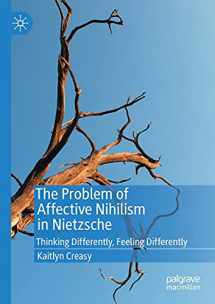
The Problem of Affective Nihilism in Nietzsche: Thinking Differently, Feeling Differently
Book details
Summary
Description
Review “Recent scholarship has recognized the centrality of overcoming nihilism for Nietzsche’s overall philosophical ambitions. In this crisp new book, Kaitlyn Creasy makes a compelling case for the importance of nihilism’s affective side within that project. She clarifies the psychology of affect and explains the complex interactions between the affective bases of nihilism and its cognitive, ideological, and cultural manifestations. Every serious Nietzsche scholar will want to engage with The Problem of Affective Nihilism.” ―R. Lanier Anderson, Professor of Philosophy, Stanford University, USA “Creasy offers a comprehensive, insightful, and nuanced discussion of Nietzschean nihilism and its connection to moral psychology. She explains how nihilism manifests as an affective condition in which a stable, mutually reinforcing cluster of depressive affects lead a person to a life-denying stance. This book is essential reading for anyone with an interest in Nietzsche on nihilism and moral psychology.” ―Paul Katsafanas, Professor of Philosophy, Boston University, USA “This book gives a very engaging account of the current state of debate on Nietzsche's idea of nihilism, and argues persuasively that it is crucially 'affective': nihilism is a problem in our feeling more than in our thinking. Creasy explores insightfully Nietzsche's diagnosis of the symptoms of this disorder, as well as his strategies for treating it. The book will be valuable to any student or scholar grappling with this topic.” ―John Richardson, Professor of Philosophy, New York University, USA Product Description Nietzsche is perhaps best known for his diagnosis of the problem of nihilism. Though his elaborations on this diagnosis often include descriptions of certain beliefs characteristic of the nihilist (such as beliefs in the meaninglessness or worthlessness of existence), he just as frequently specifies a variety of affective symptoms experienced by the nihilist that weaken their will and diminish their agency. This affective dimension to nihilism, however, remains drastically underexplored. In this book, Kaitlyn Creasy offers a comprehensive account of affective nihilism that draws on Nietzsche’s drive psychology, especially his reflections on affects and their transformative potential. After exploring Nietzsche’s account of affectivity (illuminating especially the transpersonal nature of affect in Nietzsche’s thought) and the phenomenon of affective nihilism, Creasy argues that affective nihilism might be overcome by employing a variety of Nietzschean strategies: experimentation, self-narration, and self-genealogy. From the Back Cover Nietzsche is perhaps best known for his diagnosis of the problem of nihilism. Though his elaborations on this diagnosis often include descriptions of certain beliefs characteristic of the nihilist (such as beliefs in the meaninglessness or worthlessness of existence), he just as frequently specifies a variety of affective symptoms experienced by the nihilist that weaken their will and diminish their agency. This affective dimension to nihilism, however, remains drastically underexplored. In this book, Kaitlyn Creasy offers a comprehensive account of affective nihilism that draws on Nietzsche’s drive psychology, especially his reflections on affects and their transformative potential. After exploring Nietzsche’s account of affectivity (illuminating especially the transpersonal nature of affect in Nietzsche’s thought) and the phenomenon of affective nihilism, Creasy argues that affective nihilism might be overcome by employing a variety of Nietzschean strategies: experimentation, self-narration, and self-genealogy. About the Author Kaitlyn Creasy is Assistant Professor of Philosophy at California State University, San Bernardino. Her work has been published in the Journal of Nietzsche Studies, Environmental Philosophy, and anthologies in Nietzsche studies and environmental philosophy.


We would LOVE it if you could help us and other readers by reviewing the book
Book review



